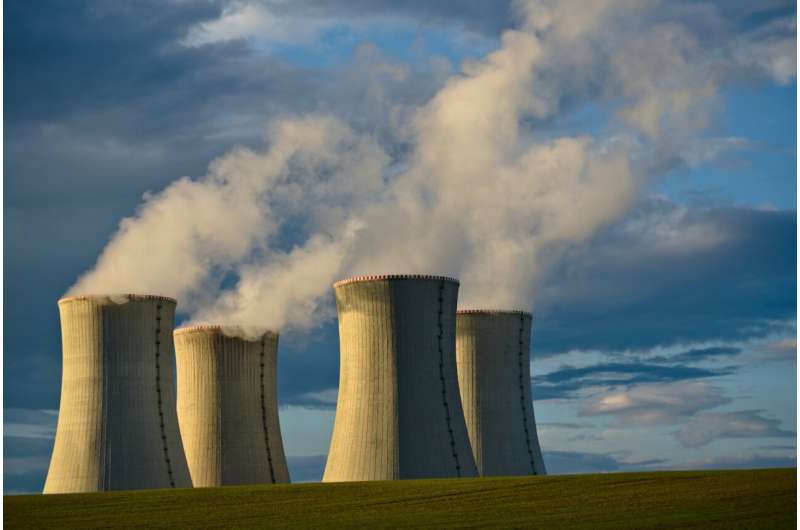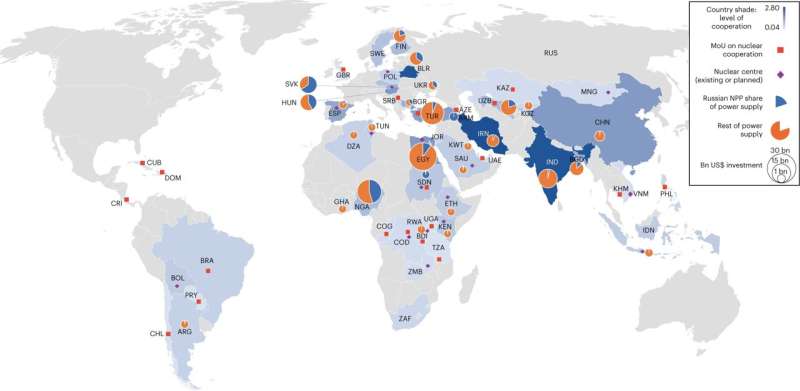Study explores the extent of Western dependency on Russian nuclear energy

Russia’s invasion of Ukraine in February 2022 had a profound deep impact on the economy, inflating the prices of energy and food, with detrimental consequences for both individuals and companies worldwide. As a result, many governments, particularly in Europe, have been discussing the possibility of reducing their dependence on Russian energy.
Most of these ongoing discussions specifically focus on fossil fuel energy, leading to the gradual introduction of sanctions for purchasing Russian coal, oil, and gas. However, Russia is also a key global provider of nuclear power, particularly via a state-owned nuclear energy corporation called Rosatom.
Researchers at the Norwegian Institute of International Affairs (NUPI) have recently carried out a study investigating the activity and global portfolio of Rosatom and its subsidiaries. Their findings, published in Nature Energy, highlight the high degree of European dependency on nuclear energy produced by this company, raising important questions about the need to find alternative energy suppliers.
“Our paper emerged as part of a longer project focusing on Russia’s visions of a future where climate policy becomes a prominent factor and its strategies for coping in a decarbonizing world, considering that Russia is the largest global fossil fuel producer,” Kacper Szulecki, one of the researchers who carried out the study, told Tech Xplore. “Consequently, we began to look at Russia’s nuclear sector as an area where economic activity and Russia’s global influence may be increasing. We were surprised that hardly anyone is talking about this sector in the context of sanctions or EU dependency.”
As part of their study, Szulecki and his colleague Indra Overland examined data released by Rosatom and online media coverage, all regarding the company’s projects and international activity since the invasion of Ukraine in 2022. At the time, Rosatom and its subsidiaries had 73 rolling projects, through which it provided energy to 29 countries.

“Building on the data we already had and some additional research we designed a study that helps us understand the levels of dependency different countries face,” Szulecki explained. “We relied on publicly available data, Rosatom’s self-reports, as well as statements and media coverage, for the basic data.”
To estimate different countries’ dependency on Russian nuclear reactors, Szulecki and Overland defined a series of hypothetical scenarios that would occur if all projects in the company’s pipeline were eventually completed. Based on these scenarios, they then calculated the share of electricity consumption in the 29 countries that Rosatom is operating in that would be covered by the company’s nuclear reactors.
“We used IEA data for these prognoses, and Rosatom’s official capacity factor for the supply side,” Szulecki said. “We also quantified all forms of cooperation to arrive at a composite index of levels of cooperation, which may be exploited for political advantage.”
Overall, the researcher found that the countries that most heavily relied on nuclear energy from Russia included Iran, Belarus, and India, followed by China, Egypt, Hungary, Turkey, Spain, Armenia, Bangladesh, Bulgaria, Slovakia, Nigeria, Uzbekistan, Finland, Czechia, Sweden, Kenya, Sudan, and Tunisia. They also identified several other countries worldwide that cooperated with Russia over nuclear energy, albeit to a lower extent.
Overall, the recent findings gathered by Szulecki and Overland suggest that while Russia’s invasion of Ukraine may have undermined Rosatom’s collaboration with countries in the euro-zone, limiting the energy it provides across Europe, many countries worldwide remain heavily dependent on Russian nuclear energy. In the future, this study could inform new efforts aimed at further reducing these countries’ dependency on Russia for nuclear energy.
“We are happy with the attention this paper has already received and we hope that it contributes to raising awareness on the worrying levels of Western dependency on Rosatom, as well as the scale of Russian nuclear energy diplomacy more broadly,” Szulecki added. “We will now continue exploring such under-researched dimensions of energy security, and we will also try to keep the data set we built updated, so that it can be a resource for future studies.”
More information:
Kacper Szulecki et al, Russian nuclear energy diplomacy and its implications for energy security in the context of the war in Ukraine, Nature Energy (2023). DOI: 10.1038/s41560-023-01228-5
© 2023 Science X Network
Citation:
Study explores the extent of Western dependency on Russian nuclear energy (2023, April 5)
retrieved 5 April 2023
from https://techxplore.com/news/2023-04-explores-extent-western-russian-nuclear.html
This document is subject to copyright. Apart from any fair dealing for the purpose of private study or research, no
part may be reproduced without the written permission. The content is provided for information purposes only.
For all the latest business News Click Here

